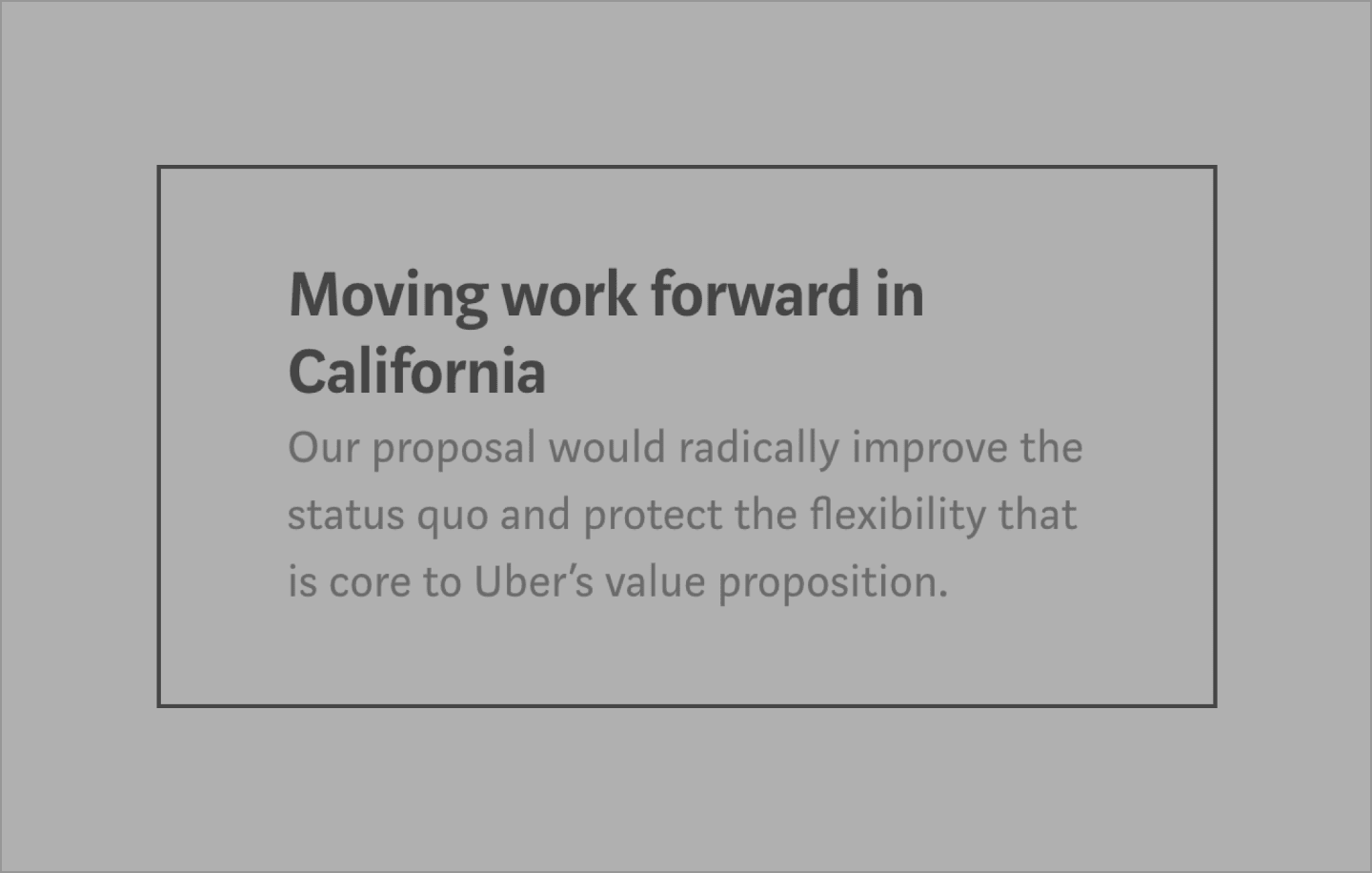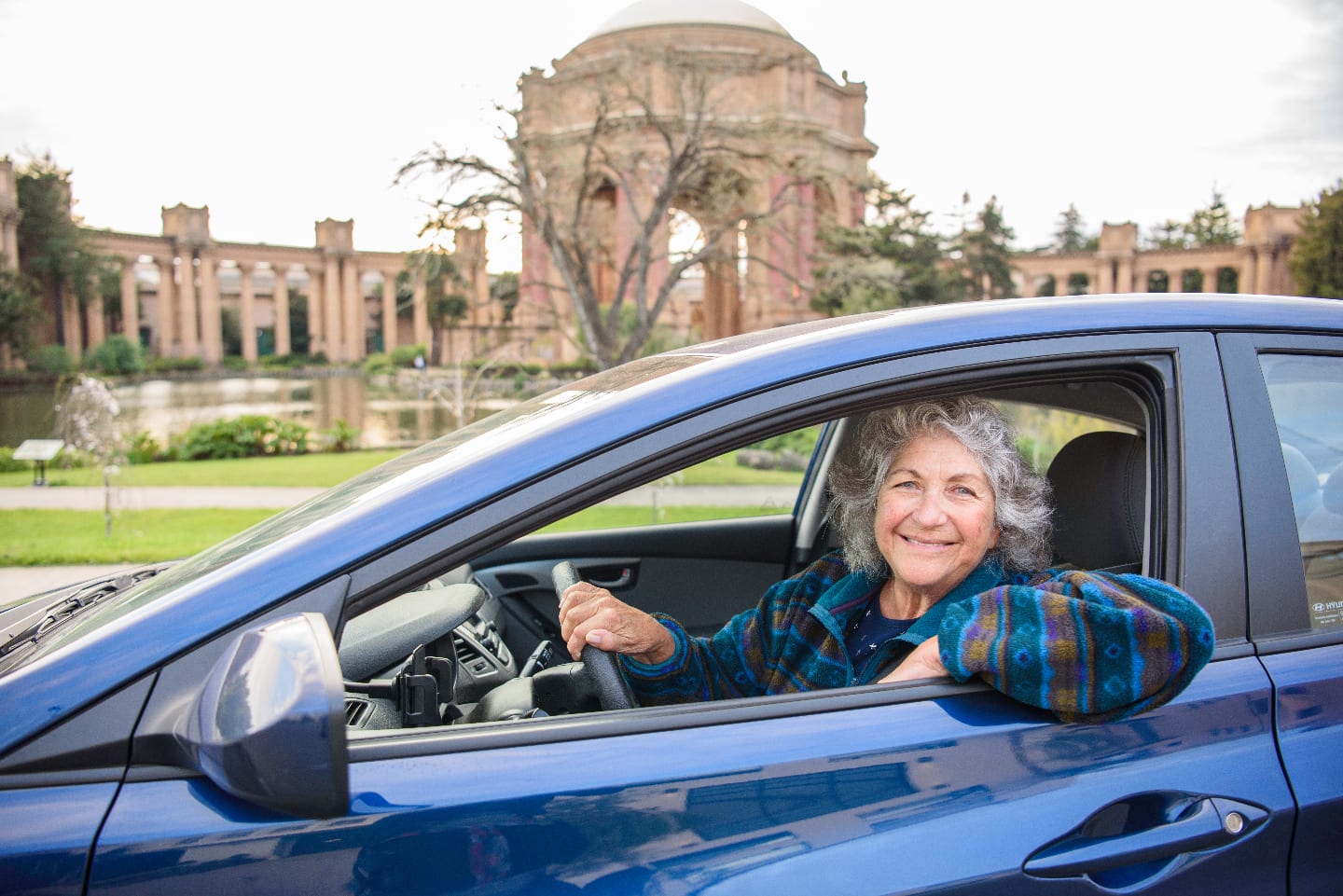
Moving Work Forward In California
Tell us your driver flexibility and independence story, and then share with your friends to spread the word →
For years, drivers have consistently told us that the primary reason they choose to use Uber is because of the flexibility to work how, when, and where they want. Survey after survey has confirmed this, and academic research has also shown that drivers derive real economic benefit from that style of work.
But ridesharing has grown to be an important part of the economy and our cities’ transportation systems, and we recognize that just providing flexibility is not enough. Millions of people across the country have elected to work with Uber, and today, society has a different expectation: that independent workers not only enjoy flexibility, but also have access to a safety net and other protections — and that technology platforms like ours step up to do their part.
Uber is ready to do our part. That is why we have been at the table in California — with other rideshare companies, lawmakers, the Governor’s office, and labor unions — to propose a truly innovative framework that we believe would preserve Uber’s key benefit for drivers (flexibility) and key benefit for riders (reliability), while improving the quality and security of independent work. California lawmakers should consider drivers’ unique needs first and foremost, and provide leadership with a new model for workers, not just add to the growing collection of industries carved out from the Dynamex decision.
We stand committed to make the necessary changes to our business to do right by drivers and ensure this first-of-its-kind framework becomes a reality in California. To be specific, this includes:
- Guaranteed earnings that would ensure drivers make a certain amount above the local minimum wage for every hour they have a rider in the car, or are driving to pick one up, as well as compensation for average expenses incurred. We have so far offered an earnings floor that would translate to approximately $21 per hour, with all the current upside to earn more regardless of a city’s minimum wage.
- We also want to make sure that choosing independent work does not mean a lack of access to benefits. We would create a new portable benefits fund administered by an independent third party into which all rideshare companies would pay. Through this fund, drivers would have access to a number of benefits determined by drivers themselves, which could include paid time off, paid sick leave, and compensation if they are unable to work due to an accident while driving.
- Lastly, in recognizing the need for drivers to have a collective voice, we have proposed sectoral bargaining as the representation model whereby drivers — through their own democratic process — would have a legally-protected right to negotiate over earnings, benefits and other decisions that impact their livelihood. We believe this type of collective bargaining would be the first of its kind in the history of the US, and is something that some labor leaders have recently been advocating for.
To be very clear: despite what some are saying, we are not arguing for the status quo, nor are we denying that independent work needs to be improved. And a false promise that employment is without its own challenges purposefully ignores the opportunity before California today to modernize the law to benefit workers. On the contrary, our proposal would dramatically improve the status quo and, we think, protect the flexibility that is both core to Uber’s value proposition for drivers and ensures a dependable service for riders.
But we need progressive legislation for this to happen, because existing laws do not allow for these important protections and representation, while also allowing for drivers to choose where, when or with whom they would like to work.
Indeed, the alternative — making all drivers full-time employees, whether or not they want it (and to be sure, most don’t) — would fundamentally change what Uber and ridesharing is. It would also effectively require us to do something that is both unrealistic and never been done before: on-demand employment. As experts have noted, converting drivers to employees will inherently come with tradeoffs, for them and for us.
We would likely have to exert more control over drivers, telling them where to work, how to work, and who they can work for. Uber would likely hire far fewer drivers than we currently support, and we’d likely have to require a minimum number of hours per week. Scheduling and rigid shifts would become the norm, and Uber would likely prevent drivers from working for other rideshare companies.
This would likely reduce the scope of where Uber operates and would prevent drivers from working at times or places where the number of drivers outstrips the demand for rides (e.g. in a quiet suburb at odd hours). While we embrace the challenge for ridesharing to improve, the ability to find extra income and a convenient ride past midnight and in areas of the state that need it most should be protected. The Rideshare Guy, a well-known personality amongst drivers, put it this way: “It doesn’t take a rocket scientist to realize that if drivers were guaranteed a minimum wage, you wouldn’t be able to just flip on the app anytime from 10AM to 3AM because there would be way too many drivers and not enough rides.”
The framework we have proposed would be innovative for all parties involved. For the labor movement, it would mean 200,000+ new members joining the fold overnight. For companies like Uber, it would provide the legal clarity needed to offer drivers access to benefits while maintaining a highly reliable service. And for California, it would be yet another moment for our home state to once again lead the nation in finding creative, pragmatic and groundbreaking answers to important societal questions.
Top Actions
-
 Update on AB5Below are remarks by Tony West, Uber’s Chief Legal Officer, as prepared for a call with media. You can find a full transcript of read more...
Update on AB5Below are remarks by Tony West, Uber’s Chief Legal Officer, as prepared for a call with media. You can find a full transcript of read more... -
 Add Your Name To Support Driver FlexibilityRight now, lawmakers in Sacramento are debating the future of rideshare drivers in California. Today, drivers work independently read more...
Add Your Name To Support Driver FlexibilityRight now, lawmakers in Sacramento are debating the future of rideshare drivers in California. Today, drivers work independently read more... -
 3 Actions You Can Take TodayLawmakers need to hear drivers' voices and personal stories in support of driver flexibility and independence. Here are 3 easy read more...
3 Actions You Can Take TodayLawmakers need to hear drivers' voices and personal stories in support of driver flexibility and independence. Here are 3 easy read more...
Please keep us as independent drivers ! This is how I support my family and being able to create my own schedule allows me to be there for them when needed. Please dont let that happen.
Please allow this work to be independent! I love being able to work around my best hours of the day and setting my own schedule. I am sure many other drivers are happy for this type of work.
Anyone that's a single parent knows how hard to juggle work and being able to be there with one phone call(kids,school or emergency etc.)me as a single dad with no help needs the flexibility Uber offers.
Please keep us as independent as possible
I am 84 years old and I have been driving for Uber for four years. I am sure that Uber is the best thing that could happen for me! What matters most is that I am able to work anywhere anytime. I am also a very active 84 year old man who does other projects in addition to driving for Uber. I am a Gospel Preacher, I am a Commercial Actor (Boostmobile TV Commercial Running Nationally) Uber affords me the opportunity to make ALL of my Auditions! Keep me independent for life!!!
If you take away independent for driving with uber or any rideshare. I'm done. I don't need people telling me when to go to work. I did that for 40 years